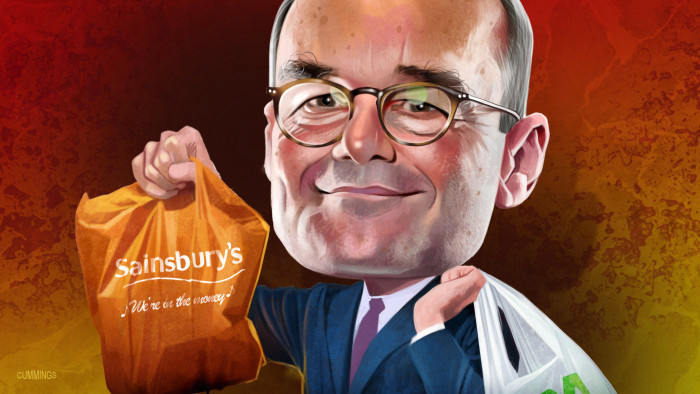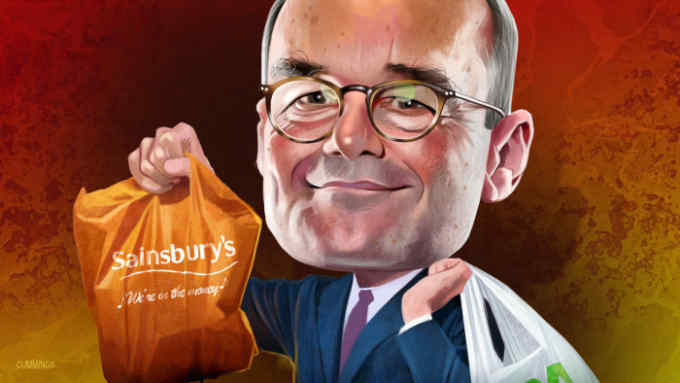Mike Coupe, the Sainsbury’s boss, regroups

Roula Khalaf, Editor of the FT, selects her favourite stories in this weekly newsletter.
Image-crafting is not Mike Coupe’s style. But if the boss of the UK’s second largest supermarket chain J Sainsbury has tried to shape how he is seen, then it is as a man who is rarely flustered.
On February 20, though, after learning the antitrust regulator was minded to block Sainsbury’s takeover of Asda, the third largest grocer, the professorial Mr Coupe took to the airwaves in uncharacteristically agitated mood.
He accused the Competition and Markets Authority of having “fundamentally moved the goalposts . . . changed the shape of the ball and chosen a completely different playing field” in its analysis. With “a completely unpredictable set of competition rules, who would invest in this country?” he told BBC Radio 4. “This is just outrageous.”
Last week, almost exactly a year after Mr Coupe and his Asda counterparts unveiled the deal — and boasted it would be great for shoppers, shareholders and suppliers — the CMA confirmed it would block the combination outright. By Wednesday, as he announced full-year results for the retailer, the cerebral 58-year-old’s mantra was that the group he has headed for nearly five years had already moved on.
But the CMA decision puts Mr Coupe among the ranks of chief executives who have seen bold strategic moves thwarted, with unpredictable consequences for their futures. After taking over the top job at Sainsbury’s from the showier Justin King in 2014, the man dubbed “Mr Straightforward” by one newspaper, told the Financial Times that a key leadership quality was to have the cojones — the balls — to make “brave” decisions. His bravery has gone unrewarded and that must hurt.
One reason the decision rankles, is his conviction the CMA’s ruling defies reason and precedent. Mr Coupe once told the alumni magazine of Birmingham university that studying physics there “gave me a scientific thought process and allows me to be objective and analytic”.
David Tyler, chairman of Sainsbury’s until March, said: “If you’re trying to get to the heart of Mike as a person, it’s the fact that he prides himself on basing his decision on the facts and the most likely trends in the markets, years ahead . . . [The decision] would offend Mike’s essential rationality.”
The Sainsbury’s-Asda team had argued that competition from discounters such as Aldi and Lidl had changed the shape of a market previously dominated by just four grocers. The CMA played that down, using tighter criteria for assessing the potential effect on competition. Critics of the decision claim that under new chair Andrew Tyrie it has become more political.
Yet one criticism of Mr Coupe is that he was too bullish in making his initial case for the deal and too insouciant about the rising political stakes. A video of the chief executive — an adept amateur guitarist — singing “We’re In the Money” from the musical 42nd Street between television interviews about the deal will haunt him for a long time.
Fans and critics agree, though, that Mr Coupe has the retail record and the mental fortitude to rebound.
Raised in West Sussex, the executive worked at Tesco, Asda and Iceland, before becoming trading director and commercial director of Sainsbury’s under Mr King. Mr Coupe puts emphasis on maintaining his and his staff’s wellbeing, eating healthily and cycling regularly, to a standard that equips him to tackle challenges such as the fearsome Mont Ventoux Tour de France stage. Without the following wind of an Asda deal, he must now reinforce Sainsbury’s against the discounters and a resurgent Tesco, still the UK’s biggest supermarket. “I think he has demonstrated pretty clearly he has resilience,” says one former colleague. “A bit of humility and a mind open to change is what is now needed.”
Will he be given the chance to show his mettle? Evidence that the failure of strategic deals dooms the executives who champion them is mixed. It depends on a blend of circumstances, board attitudes and shareholder views.
In 2016, Electrolux’s chief executive Keith McLoughlin stepped down only a month after General Electric pulled out of selling its appliances business to the group. But Tidjane Thiam, then chief executive of Prudential, the insurer, survived a 2010 shareholder veto of his ambitious attempt to buy AIA and expand in Asia long enough to be able to say, “I told you so” to critical investors, journalists and analysts, as AIA thrived.
Martin Scicluna chaired his first Sainsbury’s board meeting as Mr Tyler’s successor on the day of the final CMA ruling. As chairman of RSA, he worked with chief executive Stephen Hester as he reset the group after Zurich Insurance had abandoned its bid at the last moment, destabilising the share price.
Mr Coupe is in a different situation, as he was a progenitor of the Asda deal. But he appears to have the backing of shareholders and the new chairman. “One hundred per cent, he’s got my support,” Mr Scicluna said. “More important, he’s got the support of every single board member, executive or non-executive.”
“Life goes on,” says one person who has worked with Mr Coupe and has talked to him since the CMA ruling. “He’s resilient, he’s tough. But nobody could come through that and not be shaken by it and have part of your confidence taken away.”
On Wednesday, the Sainsbury’s boss again found himself facing gruelling public interrogations, including one on BBC Radio 4. Have you been asked to stand down after the failure of the Asda merger? he was asked. Mr Coupe was more measured than in February but just as firm: “You’ll be talking to me again, I’m sure,” he responded. “I’ll be sticking to the company.”
The writer is the FT’s management editor

Comments